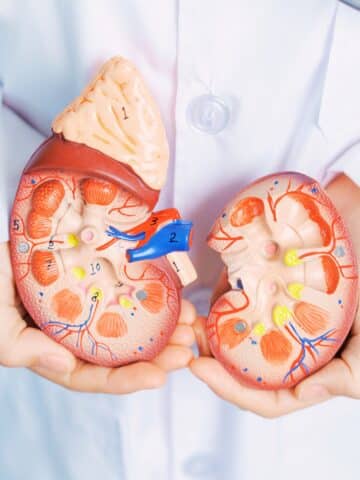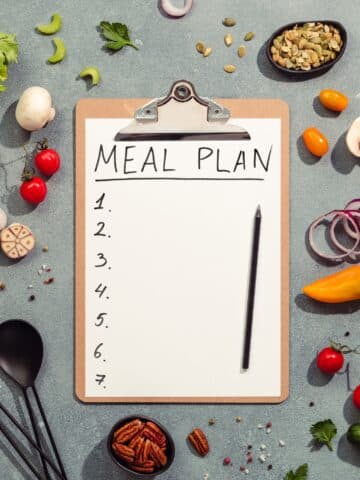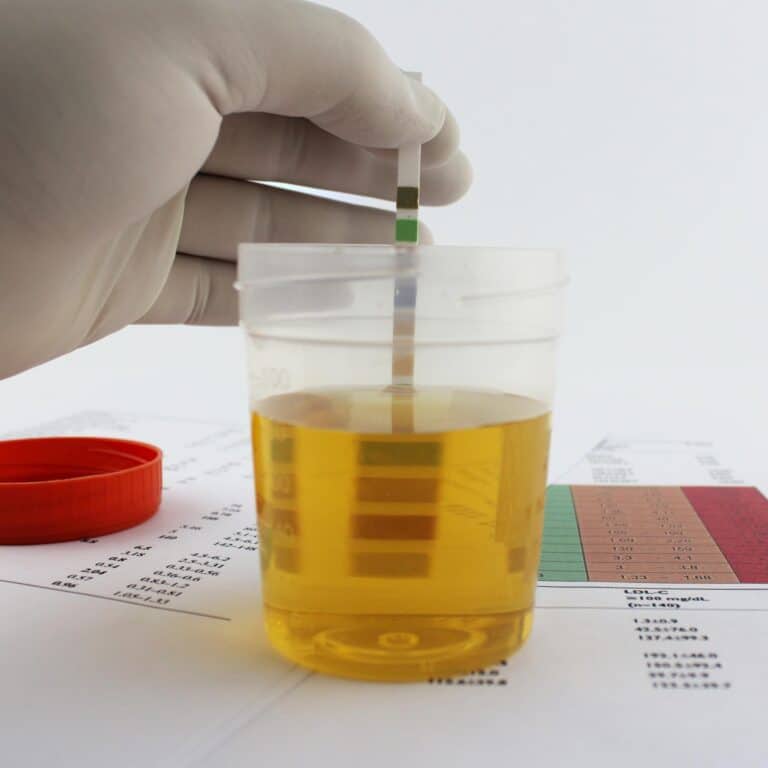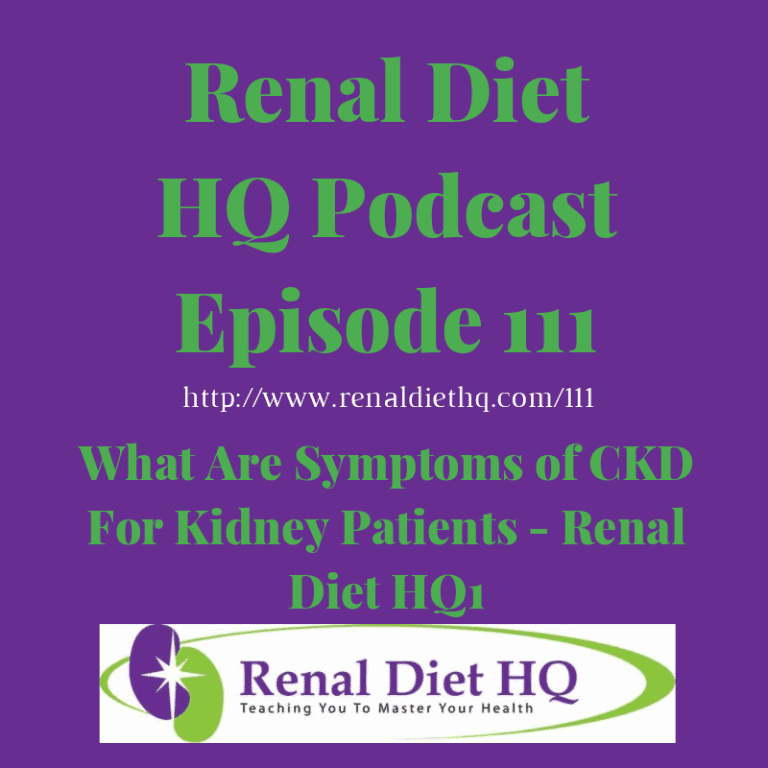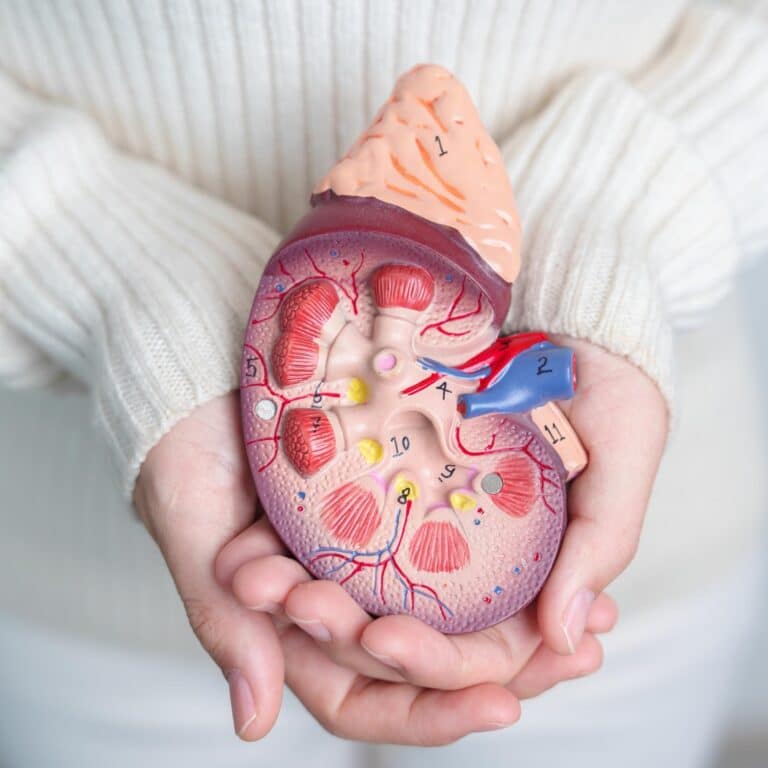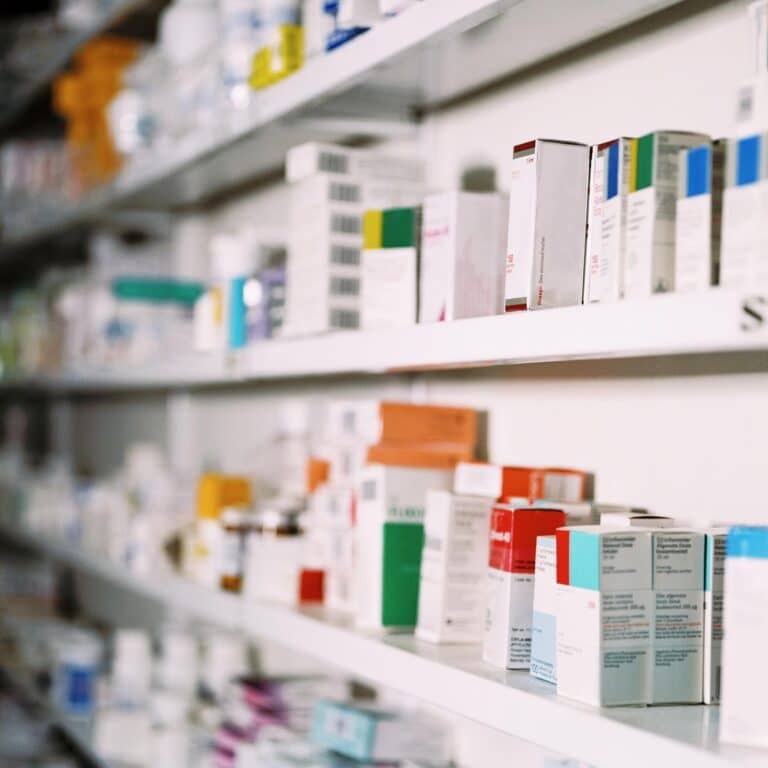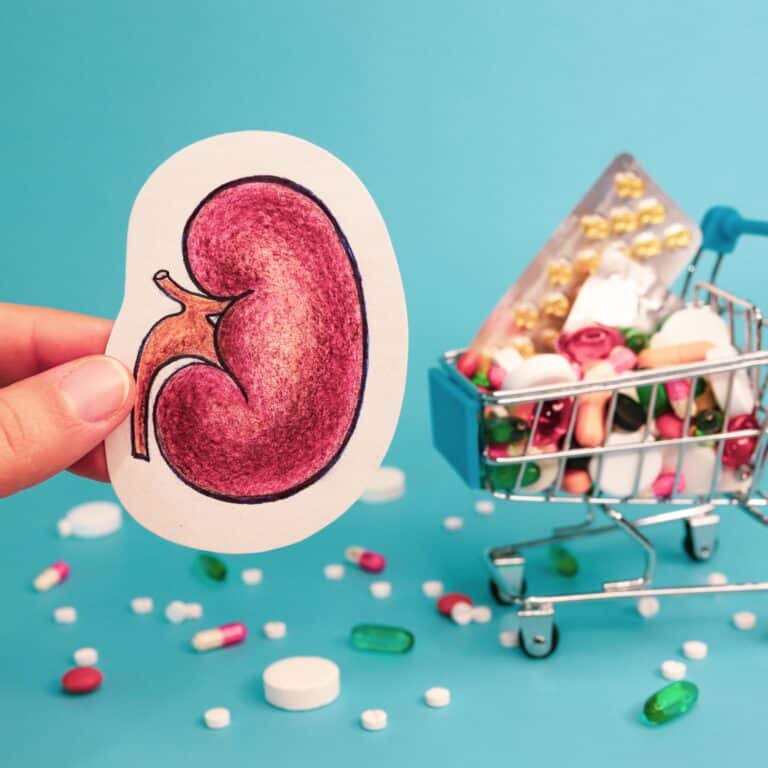Diet Vs Medication for CKD Improvement
In the world of chronic health conditions, many people truly believe that they can simply take a few pills and feel better without making any other changes to their lifestyle.
Unfortunately, that is simply untrue and you could be putting yourself at risk if you are treating your illness this way. In fact, diet and lifestyle choices can often make more of an impact on your condition than medication.
Chronic kidney disease (CKD) is a good example of a chronic illness that can be affected by diet even more than medication. That doesn't mean that you should not take your medication as prescribed, but simply that you will notice a huge difference in your overall comfort and condition when you follow through with a kidney friendly diet.
Discover the role of diet in managing CKD, as well as the importance of medication in its treatment.
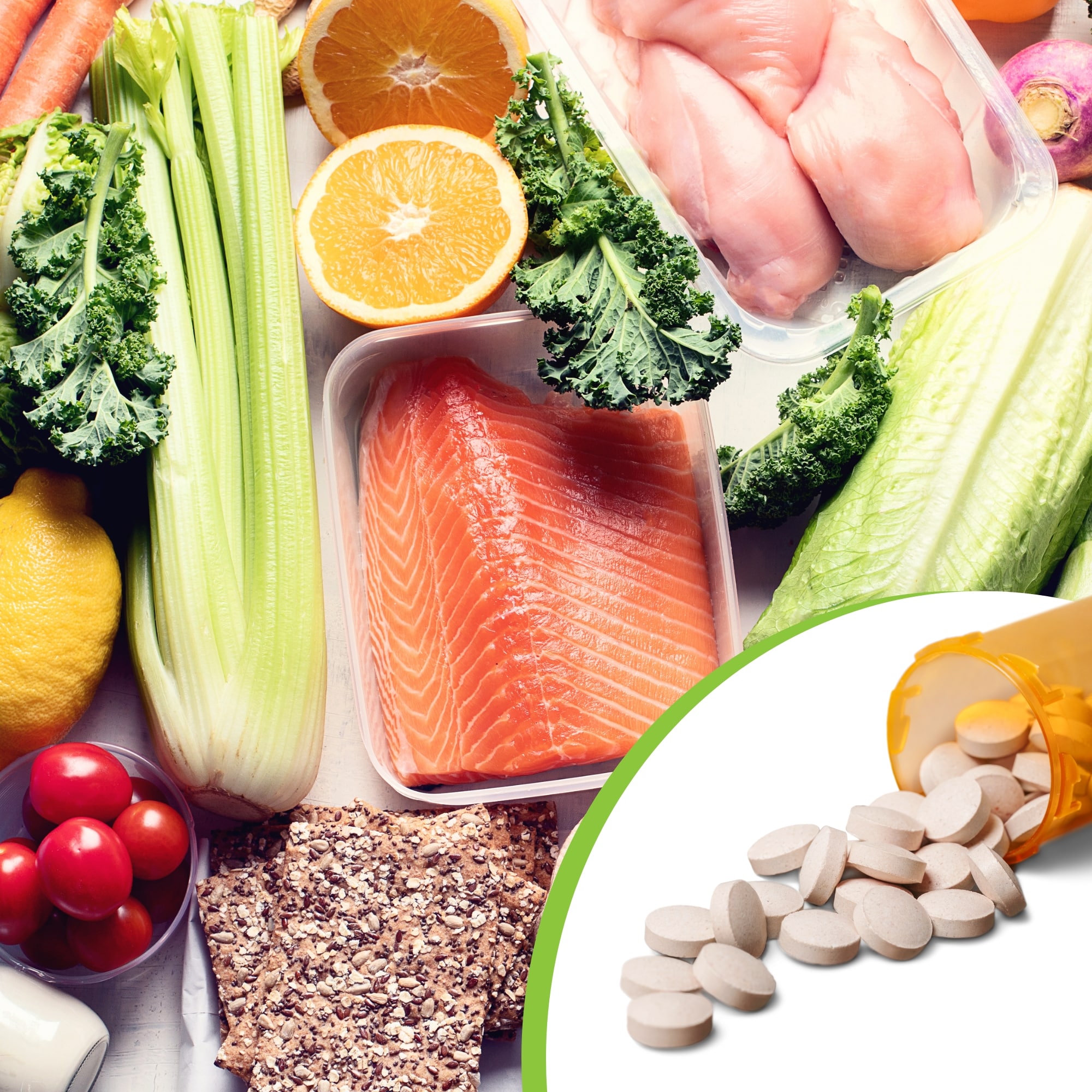
Jump to:
- Key Takeaways
- The Role of Diet in CKD Improvement
- The Importance of Medication in CKD Treatment
- Pros and Cons of Dietary Changes for CKD Management
- Combining Diet and Medication for Optimal CKD Treatment
- Assessing the Effectiveness of Diet in Improving CKD
- Evaluating the Efficacy of Medication in CKD Management
- The Impact of Meal Planning for Renal Diet on CKD Progression
- Medication as a Tool for Slowing Down CKD Advancement
- Finding the Right Balance: Diet and Medication for CKD Improvement
- FAQs for Diet vs. Medication
- Making a Difference: Diet vs. Medication
Key Takeaways
- Diet can slow down kidney function decline and reduce symptoms of CKD.
- Medication maintains kidney health, slows down CKD progression, and manages symptoms like anemia and bone disease.
- Dietary changes and a renal diet help slow the progression of CKD, reduce the workload on kidneys, and provide essential nutrients.
- Combining medication with lifestyle changes (ckd and diabetes medications), such as a well-balanced diet, can lead to improved kidney function, control of blood pressure, and reduced risk of complications.
The Role of Diet in CKD Improvement
When it comes to managing chronic kidney disease, the impact of diet cannot be underestimated. Your dietary choices can have a significant influence on the progression and severity of CKD.
Making appropriate changes to your diet can slow down loss of kidney function, reduce symptoms, and even delay the need for dialysis or kidney transplantation due to end stage renal disease (ESRD or end stage kidney disease).
Therefore, considering diet as a treatment option alongside medication is crucial in improving your overall kidney health.
For More Recipes and Ideas --->> Get Your Free Meals and Recipes That Are Perfect for Pre-Dialysis Diets, Pre-Dialysis with Diabetes, or Dialysis Diets.
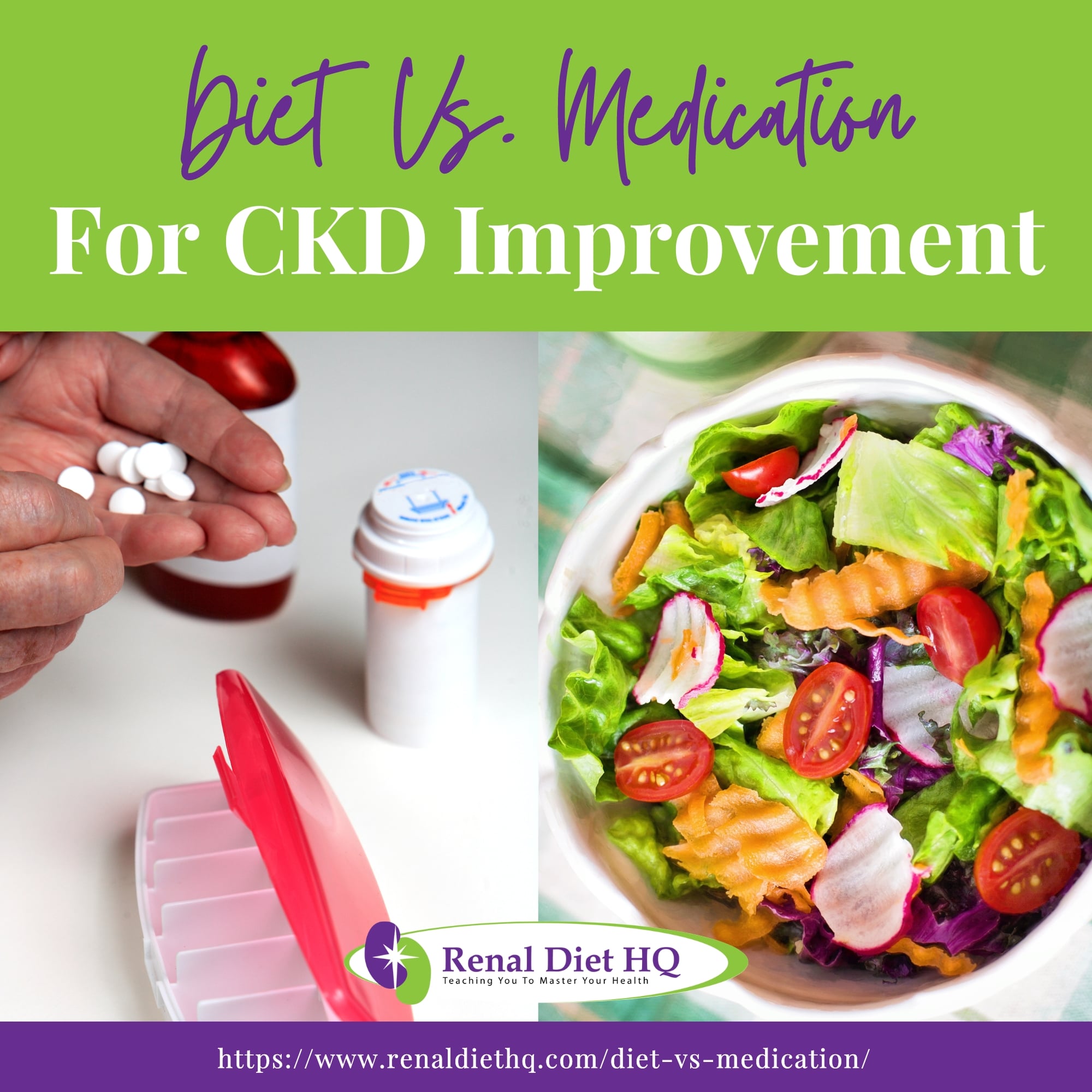
Diet as Treatment Option
To effectively manage your condition, it's important to understand that incorporating dietary changes can serve as a treatment option for CKD. Dietary interventions and nutritional therapy play a crucial role in managing chronic kidney disease.
Following renal diet basics, which includes specific dietary restrictions and lifestyle modifications, can help slow the progression of the disease and improve overall health outcomes.
A renal diet focuses on reducing the intake of certain nutrients such as sodium, potassium, phosphorus, and protein. By limiting these substances, you can help reduce the workload on your kidneys and prevent further damage.
Additionally, incorporating more fruits and vegetables into your diet can provide essential vitamins and minerals while keeping calorie intake in check.
It's important to work with a registered kidney dietitian who specializes in kidney disease to develop an individualized healthy eating plan based on your unique needs. They will consider factors such as your stage of CKD, blood tests, medications, and personal preferences.
Remember that dietary changes alone may not be enough to manage all aspects of CKD. It is often used in conjunction with medication and other medical interventions prescribed by your healthcare team.
By taking an active role in managing your diet alongside other treatment options, you can optimize your health outcomes and improve quality of life.
Dietary Impact on CKD
The right renal diet is a powerful tool in managing Chronic Kidney Disease, as it can significantly delay disease progression and prevent complications.
By carefully controlling the intake of protein, sodium, potassium, and phosphorus, a renal diet reduces the workload on the kidneys. Lower protein intake minimizes the generation of waste products, easing the kidneys' burden.
Limiting sodium helps in management of blood pressure and reduction of excess fluid while potassium and phosphorus restrictions prevent electrolyte imbalances and bone issues.
Moreover, a renal diet promotes overall health by maintaining optimal body weight, controlling blood sugar levels, and reducing the risk of cardiovascular complications. It empowers individuals with CKD to actively participate in their health management, improving their quality of life and slowing the disease's advancement.
Consulting with a registered kidney dietitian experienced in renal nutrition is crucial for tailoring a personalized diet plan to individual needs and ensuring the best outcomes in CKD management.
The Importance of Medication in CKD Treatment
When it comes to managing chronic kidney disease, medication plays a crucial role in maintaining kidney health and slowing down the progression of the disease.
Medications such as angiotensin-converting enzyme (ACE) inhibitors or angiotensin receptor blockers (ARBs) are commonly prescribed to control blood pressure and reduce proteinuria, both of which can help protect the kidneys.
Additionally, certain medications may be used to manage symptoms associated with CKD, such as anemia or bone disease, providing patients with a better quality of life while living with this condition.
Medication and Kidney Health
Medications play a critical role in the management of Chronic Kidney Disease (CKD) by addressing underlying causes, controlling symptoms, and preventing complications. Here are some common medications used in CKD management:
| Medication Category | Examples | Importance |
| Blood Pressure Control | ACE inhibitors (e.g., Enalapril), Angiotensin II receptor blockers (ARBs) (e.g., Losartan) | These antihypertensive medications help lower high blood pressure, reduce strain on the kidneys and slow progression. They also reduce proteinuria, a common CKD symptom. |
| Anemia Management | Erythropoiesis-stimulating agents (e.g., Epoetin alfa), Iron supplements | Anemia is common in CKD. These medications stimulate red blood cell production and replenish iron stores, alleviating fatigue and improving overall well-being. |
| Phosphate Binders | Calcium-based (e.g., Calcium acetate), Non-calcium-based (e.g., Sevelamer) | CKD often leads to high phosphorus levels. Phosphate binders help control phosphorus absorption, preventing bone and cardiovascular complications. |
| Vitamin D Analogs | Calcitriol, Paricalcitol | These medications manage calcium and phosphorus levels, promoting bone health and reducing secondary hyperparathyroidism often seen in CKD. |
| Potassium Binders | Patiromer, Sodium zirconium cyclosilicate | To manage high potassium levels (hyperkalemia), these binders help remove excess potassium from the body, preventing cardiac arrhythmias. |
Proper medication management in CKD is essential to address comorbidities, control symptoms, and slow disease progression. People with kidney disease should work closely with their healthcare providers to determine the most appropriate medications and dosages based on their individual health and kidney function.
Managing CKD With Medication
Medication compliance is a crucial aspect of slowing down Chronic Kidney Disease progression. Many people with kidney disease are prescribed medications to manage underlying conditions like high blood pressure, diabetes, and anemia, which can accelerate kidney damage (anemia and dialysis).
Adhering to these medications as prescribed helps maintain these conditions within optimal ranges, reducing the added stress on the kidneys. For instance, controlling blood pressure with medications like ACE inhibitors or ARBs can prevent further kidney damage caused by hypertension.
Medications that manage anemia, such as erythropoiesis-stimulating agents, can improve hemoglobin levels, enhancing overall well-being and potentially slowing disease progression.
Furthermore, phosphate binders and vitamin D analogs help maintain mineral and bone health, crucial for preventing complications related to CKD.
Consistent medication compliance, along with lifestyle modifications and dietary changes, empowers people with kidney disease to actively manage their condition, slowing its progression and improving their long-term kidney health and quality of life.
Pros and Cons of Dietary Changes for CKD Management
Dietary changes play a pivotal role in managing Chronic Kidney Disease, but they come with both advantages and challenges. Tailoring one's diet to mitigate the progression of CKD involves a delicate balance of limiting certain nutrients while ensuring adequate nutrition.
This section delves into the pros and cons of dietary modifications for CKD management, shedding light on the benefits and potential complexities individuals may encounter as they navigate their path to improved kidney health. You can also avoid kidney failure with dietary changes.
Pros: Impact on Kidney Function
- Disease Progression Control: A renal diet effectively slows the progression of Chronic Kidney Disease by reducing the intake of protein, sodium, potassium, and phosphorus. This helps in preserving kidney function and preventing complications.
- Blood Pressure Management: Limiting sodium intake helps control blood pressure, a crucial aspect of CKD management. Lower blood pressure reduces the strain on the kidneys and minimizes the risk of cardiovascular issues.
- Minimized Electrolyte Imbalances: Careful control of potassium and phosphorus intake prevents dangerous imbalances
- , reducing the risk of bone problems, heart issues, and muscle weakness.
- Symptom Alleviation: A renal diet can alleviate common CKD symptoms like fatigue, edema (swelling), and shortness of breath, enhancing the patient's overall well-being.
- Nutritional Balance: Despite restrictions, a well-planned renal diet ensures patients receive adequate nutrition, helping maintain strength and energy levels.
- Empowerment: Patients actively participating in their care by adhering to a renal diet gain a sense of control over their health, potentially improving their adherence to other aspects of CKD management.
In summary, a renal diet is a cornerstone of CKD management, offering numerous benefits in terms of preserving kidney function, controlling blood pressure, minimizing complications, and enhancing overall quality of life.
Challenges of a Renal Diet
- Dietary Restrictions: One of the most significant challenges is the restrictive nature of a renal diet. Patients must limit protein, sodium, potassium, and phosphorus intake, which can make meal planning and variety challenging.
- Nutritional Imbalance: Meeting nutritional needs while adhering to these restrictions can be difficult. Patients may struggle to get enough protein, vitamins, and minerals, leading to potential nutrient deficiencies.
- Limited Food Choices: Renal diets may lead to reduced food choices and can be monotonous, impacting the enjoyment of meals.
- Social Impact: Adhering to a renal diet in social settings, such as gatherings or restaurants, can be isolating and challenging. Patients may feel left out or find it hard to find suitable options.
- Monitoring and Planning: Consistently monitoring and planning meals, reading food labels, and calculating nutrient content can be time-consuming and mentally taxing.
- Adherence Hurdles: Sticking to a renal diet can be challenging due to its strict nature. Patients may struggle with compliance, which can impact the effectiveness of the diet.
Overall, while a renal diet is essential for managing renal diseases, it comes with several challenges that can affect patients' quality of life, dietary satisfaction, and overall well-being. Learning about managing your kidney disease gets easier with time.
Combining Diet and Medication for Optimal CKD Treatment
When it comes to managing chronic kidney disease (CKD), you may have heard about the importance of both diet and medication. But did you know that combining these two treatment approaches can yield even greater benefits?
The synergy between diet and medication in CKD treatment can help maximize therapeutic outcomes, improving kidney function, reducing symptoms, and slowing down disease progression.
Benefits of Combining Diet and Medication
Combining diet and medication is a powerful approach for managing Chronic Kidney Disease.
Firstly, tailored dietary plans can mitigate stress on the kidneys by limiting protein, sodium, and phosphorus intake. Medications such as angiotensin-converting enzyme (ACE) inhibitors or angiotensin II receptor blockers (ARBs) can complement this by controlling blood pressure and reducing proteinuria, thus preserving kidney function.
Moreover, dietary strategies can address specific CKD-related complications, like hyperkalemia or acidosis, by adjusting potassium and acid-forming food consumption.
Medications like phosphate binders help control phosphorus levels. Coordinating diet and medication ensures a comprehensive approach, minimizing side effects and optimizing therapeutic outcomes.
Furthermore, combined therapy enhances patient compliance by providing a holistic, manageable approach to CKD management, improving quality of life.
Regular monitoring and adjustments by healthcare professionals help achieve personalized treatment plans, making the integration of diet and medication a cornerstone in slowing CKD progression and preventing complications.
Synergy of Treatments
Combining diet modification (renal diet) with medications in managing Chronic Kidney Disease creates a synergistic effect that offers superior benefits compared to each individual treatment alone.
Firstly, a renal diet tailored to CKD reduces the intake of protein, sodium, and phosphorus, lessening the workload on the kidneys. This dietary approach can slow the progression of CKD and mitigate complications.
However, it may not fully control blood pressure or address specific issues like proteinuria. This is where medications, such as angiotensin-converting enzyme (ACE) inhibitors or angiotensin II receptor blockers (ARBs), come into play. They complement the diet by effectively managing blood pressure and reducing proteinuria.
The synergy lies in the fact that medications can provide targeted intervention where diet alone may fall short. Conversely, the renal diet can reduce the medication burden by minimizing the need for additional drugs to control factors like hyperkalemia or phosphorus levels.
Together, they create a comprehensive approach, maximizing therapeutic outcomes and minimizing side effects.
Furthermore, the combined approach enhances patient compliance as it offers a manageable and holistic strategy. Regular monitoring by healthcare professionals ensures personalized treatment plans, optimizing CKD management.
In all, the synergy of diet modification and medications addresses CKD from multiple angles, making it a more effective and well-rounded approach than either treatment option on its own. You can also check out these commonly prescribed medications for CKD.
Maximizing Therapeutic Benefits
By implementing both dietary changes and medication, you can maximize the therapeutic benefits of your treatment plan for CKD. It is important to take a personalized approach to your treatment, as each individual's needs may vary. Your healthcare provider will work with you to create a plan that suits your specific condition and lifestyle.
To help you understand the importance of this combination approach, let's look at some key factors in a table format:
| Factors | Dietary Changes | Medication |
| Maximizing Compliance | Following a renal-friendly diet can be challenging, but with proper education and support, it becomes easier to adhere to. | Medications are prescribed based on your specific needs and should be taken as directed by your healthcare provider. |
| Potential Side Effects | Dietary changes rarely have side effects when done correctly. However, certain medications may have potential side effects that need monitoring. | Some medications may cause side effects such as nausea or dizziness. If you experience any unusual symptoms, contact your healthcare provider immediately. |
| Cost Effectiveness | Making dietary changes can be cost-effective in the long run since it involves consuming whole foods rather than processed ones. | The cost of medications varies depending on factors like insurance coverage and generic alternatives available. Discuss any financial concerns with your healthcare provider. |
| Patient Education | Learning about renal-friendly foods and portion control is crucial for successful management of CKD. | Understanding the purpose, dosage, and potential interactions of medications is equally important for effective treatment. |
Remember that patient education plays a vital role in managing CKD effectively. Consult with your healthcare team regularly to ensure you are maximizing the benefits while minimizing any potential risks associated with both dietary changes and medication use.
Assessing the Effectiveness of Diet in Improving CKD
When it comes to managing chronic kidney disease (CKD), the debate between diet and medication often arises. You may be wondering which approach is more effective in improving CKD.
Research has shown that dietary interventions can play a significant role in slowing down the progression of CKD and reducing the risk of complications, such as cardiovascular diseases.
However, it is important to note that medication may still be necessary in some cases to effectively manage CKD symptoms and prevent further damage to the kidneys.
Importance of Renal Diet in CKD Management
A renal diet is indispensable in the management of Chronic Kidney Disease due to several compelling reasons.
How quickly will my Chronic Kidney Disease progress to dialysis? Firstly, CKD disrupts the kidney's ability to effectively filter waste and excess fluids from the bloodstream. A well-planned renal diet helps ease this burden on the kidneys by regulating the intake of key nutrients like protein, sodium, and phosphorus. This dietary control can significantly slow the progression of CKD and prevent further damage.
Secondly, a renal diet plays a vital role in managing complications associated with CKD, such as hypertension, electrolyte imbalances, and mineral abnormalities. It helps control blood pressure and keeps electrolyte levels in check, reducing the risk of dangerous complications like hyperkalemia.
Moreover, a renal diet complements medical treatment by minimizing the need for additional medications. By reducing proteinuria, controlling extra fluid retention, and managing mineral imbalances, it can alleviate the necessity for certain drugs, ultimately leading to fewer side effects and a better quality of life for CKD patients.
A renal diet is an integral part of CKD management because it directly supports kidney function, manages complications, and enhances the effectiveness of medical treatment, ultimately improving the overall well-being of individuals with CKD.
Efficacy of Dietary Interventions
Understanding the comparative effectiveness of dietary interventions is crucial for informed decision-making about treatment plans for managing CKD.
When it comes to improving renal function and managing chronic kidney disease, dietary restrictions, nutritional supplementation, renal specific diets, and lifestyle modifications play a vital role. These interventions aim to optimize nutrition while minimizing the burden on the kidneys.
To better understand the impact of dietary interventions in CKD management, let's take a look at their potential benefits:
| Dietary Interventions | Renal Function Improvement |
| Dietary Restrictions | Can slow down disease progression by reducing stress on the kidneys |
| Nutritional Supplementation | May help replenish essential nutrients that are lost due to impaired kidney function |
| Renal Specific Diet | Tailored diet plans can help manage fluid balance, blood pressure, electrolyte levels, and waste buildup |
| Lifestyle Modifications | Incorporating regular exercise and quitting smoking can positively impact overall health and well-being |
Evaluating the Efficacy of Medication in CKD Management
When it comes to managing chronic kidney disease, medication plays a crucial role in improving patient outcomes. Understanding the effectiveness of medication in CKD management is essential for healthcare professionals and patients alike.
In this discussion, we will explore the importance of various medications used in the treatment of CKD and their impact on disease progression, symptom management, and overall quality of life.
Medication Effectiveness in CKD
Medications are indispensable in the management of Chronic Kidney Disease (CKD) for several crucial reasons.
Firstly, CKD often leads to complications such as high blood pressure and proteinuria, which can further damage the kidneys. Medications like angiotensin-converting enzyme (ACE) inhibitors or angiotensin II receptor blockers (ARBs) are vital in controlling these complications, helping to preserve kidney function.
Secondly, CKD frequently causes electrolyte imbalances and mineral abnormalities, including hyperkalemia and elevated phosphorus levels. Medications such as phosphate binders and potassium-lowering drugs are essential to maintain proper electrolyte balance and prevent dangerous complications.
Furthermore, medications can address specific symptoms and comorbidities associated with CKD, such as anemia or bone health issues, improving the patient's overall quality of life.
Lastly, medications are often needed to manage pain, reduce inflammation, or treat other medical conditions that CKD patients may develop over time.
Medications are a fundamental component of CKD management because they are instrumental in controlling complications, preserving kidney function, maintaining electrolyte balance, and addressing associated health issues, ultimately enhancing the well-being and longevity of individuals with CKD.
Medication Dose Adjustment in CKD
Dose adjustments for medications in Chronic Kidney Disease (CKD) patients are crucial to ensure both therapeutic effectiveness and patient safety. CKD can significantly alter drug metabolism and clearance, leading to potential toxicities or reduced efficacy if dosages aren't appropriately modified.
- Reduced Clearance: In CKD, impaired kidney function often results in slower drug elimination. Medications primarily cleared by the kidneys, like certain antibiotics or anticoagulants, may require reduced doses to prevent accumulation and potential toxicity.
- Altered Pharmacodynamics: CKD can also affect how drugs interact with their target receptors. For instance, CKD patients may exhibit altered responses to medications affecting blood pressure or calcium regulation, necessitating individualized dosing adjustments.
- Drug-Drug Interactions: CKD patients may be taking multiple medications, which can lead to drug-drug interactions. Dose adjustments become critical to prevent adverse effects or compromised therapeutic outcomes.
- Monitoring: Regular monitoring of drug levels, renal function, and potential side effects is essential in CKD patients to tailor doses effectively. This ensures that medication regimens remain safe and effective throughout the course of CKD management.
CKD-related alterations in drug metabolism and excretion demand careful consideration and dose adjustments for medications to optimize therapeutic benefits and minimize potential harm in CKD patients. Consultation with healthcare professionals is crucial to make these necessary modifications safely and effectively.
The Impact of Meal Planning for Renal Diet on CKD Progression
Meal planning is a vital aspect of managing Chronic Kidney Disease (CKD) effectively. The foods we consume directly impact kidney function and disease progression.
This part explores how thoughtful and strategic meal planning tailored to a renal diet can significantly influence CKD progression.
By understanding the importance of dietary choices and their impact on kidney health, individuals with CKD can take proactive steps in their meal planning to slow down the advancement of this chronic condition and improve their overall well-being.
Effect of Meal Planning for Effective Renal Diet
Meal planning plays a great role in enhancing the effectiveness of a renal diet for individuals with Chronic Kidney Disease. A well-structured kidney friendly eating plan tailored to CKD requirements is essential for several reasons.
Firstly, meal planning ensures adherence to specific dietary restrictions crucial for kidney health. It allows individuals to manage their intake of key nutrients such as protein, sodium, potassium, and phosphorus, which can directly affect CKD progression. Controlling these elements helps reduce the workload on the kidneys and mitigate complications.
Secondly, meal planning promotes variety and balance, making it easier to meet essential nutritional needs while avoiding excessive intake of harmful substances. This aids in maintaining overall health and well-being, which is particularly important for CKD patients who may face other health challenges.
Furthermore, meal planning enables better control over portion sizes and calorie intake, facilitating weight management, blood pressure control, and the prevention of complications like diabetes.
Effective meal planning is a cornerstone of CKD management as it empowers individuals to navigate the complexities of a renal diet, thereby improving their overall health, slowing disease progression, and enhancing their quality of life.
Meal Planning in CKD Nutrition
What not to eat on a renal diet? Starting meal planning for Chronic Kidney Disease nutrition can be overwhelming, but with some guidance and organization, it becomes manageable. Here are some tips to help get you started:
- Consult a Dietitian: Begin by consulting a registered kidney dietitian with expertise in CKD. They can assess your specific needs and provide personalized guidance.
- Understand Your Dietary Restrictions: Familiarize yourself with CKD dietary restrictions, particularly regarding protein, sodium, potassium, and phosphorus. This knowledge is crucial for informed meal planning.
- Plan Balanced Meals: Design meals that include a variety of food groups to ensure balanced nutrition. For example, a breakfast could consist of oatmeal (low in phosphorus) topped with fresh berries (low in potassium) and a small serving of egg whites (low in phosphorus and potassium).
- Portion Control: Pay attention to portion sizes to avoid overloading on nutrients like protein or potassium. Use measuring cups or a food scale to help with accurate servings.
- Cook at Home: Preparing meals at home gives you control over ingredients and cooking methods. Opt for cooking methods that reduce sodium, like grilling or roasting instead of frying.
- Use CKD-Friendly Ingredients: Incorporate CKD-friendly ingredients like cauliflower (low in potassium) as a rice substitute or using herbs and spices for flavor instead of salt.
- Monitor Fluid Intake: Keep track of your daily fluid intake, as CKD may require fluid restriction. Limiting high-fluid foods like soup or water-rich fruits (e.g., watermelon) may be necessary.
- Keep a Food Journal: Maintain a food diary to track your meals, snacks, and fluid intake. This can help identify patterns and areas for improvement in your CKD diet.
Starting meal planning for CKD nutrition can be a positive step toward managing the condition effectively. By following these tips and working closely with a healthcare team, you can develop a practical and sustainable CKD-friendly meal plan tailored to your unique needs.
Medication as a Tool for Slowing Down CKD Advancement
When it comes to managing CKD, medication can be an effective tool in slowing down the progression of the disease. Various medications, such as ACE inhibitors and angiotensin receptor blockers, have been shown to help reduce proteinuria and lower blood pressure in patients with CKD.
Medications for Slowing Down CKD Progression
Medications play a crucial role in slowing down the progression of Chronic Kidney Disease. The choice of medications depends on the underlying cause of CKD, the stage of the disease, and individual patient factors. Here are some key medications used for this purpose:
- Angiotensin-Converting Enzyme (ACE) Inhibitors and Angiotensin II Receptor Blockers (ARBs): These blood pressure medications, such as lisinopril or losartan, are commonly prescribed to CKD patients, especially those with diabetes or high blood pressure. They help relax blood vessels, reduce proteinuria (excess protein in urine), and lower blood pressure, which can slow the progression of kidney damage.
- Diuretics: Diuretics like furosemide are used to control fluid buildup and edema in CKD patients, which can help manage blood pressure and reduce the strain on the kidneys.
- Phosphate Binders: In advanced CKD, the kidneys may have difficulty excreting excess phosphorus. Medications like sevelamer or calcium-based binders help lower phosphorus levels in the blood, preventing complications like bone disease.
- Erythropoiesis-Stimulating Agents (ESAs): Anemia is a common complication of CKD. ESAs like epoetin alfa stimulate red blood cell production, improving oxygen delivery and energy levels in CKD patients.
- Statins: High cholesterol is a risk factor for CKD progression. Cholesterol lowering therapy (Statins) like atorvastatin may be prescribed to manage cholesterol levels and reduce cardiovascular risk.
- Sodium Bicarbonate: In CKD patients with metabolic acidosis (excess acid in the blood), sodium bicarbonate supplements can help correct acid-base imbalances.
- Immunosuppressants: In cases of CKD caused by autoimmune disorders like lupus nephritis, immunosuppressive drugs such as corticosteroids, azathioprine, or mycophenolate mofetil may be used to reduce inflammation and slow kidney damage.
- SGLT2 Inhibitors: Recent research has shown that SGLT2 inhibitors like empagliflozin may have benefits in slowing CKD progression, especially in patients with diabetes.
It's essential to note that medication management for CKD is highly individualized. Regular monitoring of kidney function, blood pressure, and laboratory values is crucial to adjust medication dosages and types as needed.
Combining medication with lifestyle modifications, including a renal diet, can be a comprehensive approach to slowing CKD progression and preserving kidney function. Patients should work closely with their healthcare team to develop a personalized treatment plan tailored to their specific needs.
Choosing the Right Medication Regimen
Selecting the appropriate medication regimen for Chronic Kidney Disease is a critical process that should be undertaken in close consultation with a nephrologist or kidney specialist.
Nephrologists possess specialized knowledge about CKD, its underlying causes, and the intricacies of kidney function, making them invaluable in crafting an individualized treatment plan.
The importance of this collaboration cannot be overstated. Nephrologists can assess the specific CKD stage, identify underlying causes, and determine the most suitable medications to address the patient's unique needs. They monitor kidney function and adjust medication dosages as required to optimize therapeutic benefits while minimizing side effects.
Medication compliance is equally vital in CKD management. Patients must adhere to their prescribed medication regimen diligently. Non-compliance can lead to uncontrolled blood pressure, electrolyte imbalances, and other complications that accelerate CKD progression.
Nephrologists educate patients about the importance of taking medications as directed and provide strategies to manage potential side effects or drug interactions.
Selecting the right medication regimen for CKD and adhering to it as directed by a nephrologist is essential for slowing disease progression, managing complications, and preserving kidney function. The expertise and guidance of a nephrologist, combined with patient commitment to medication compliance, are crucial elements in effective CKD management.
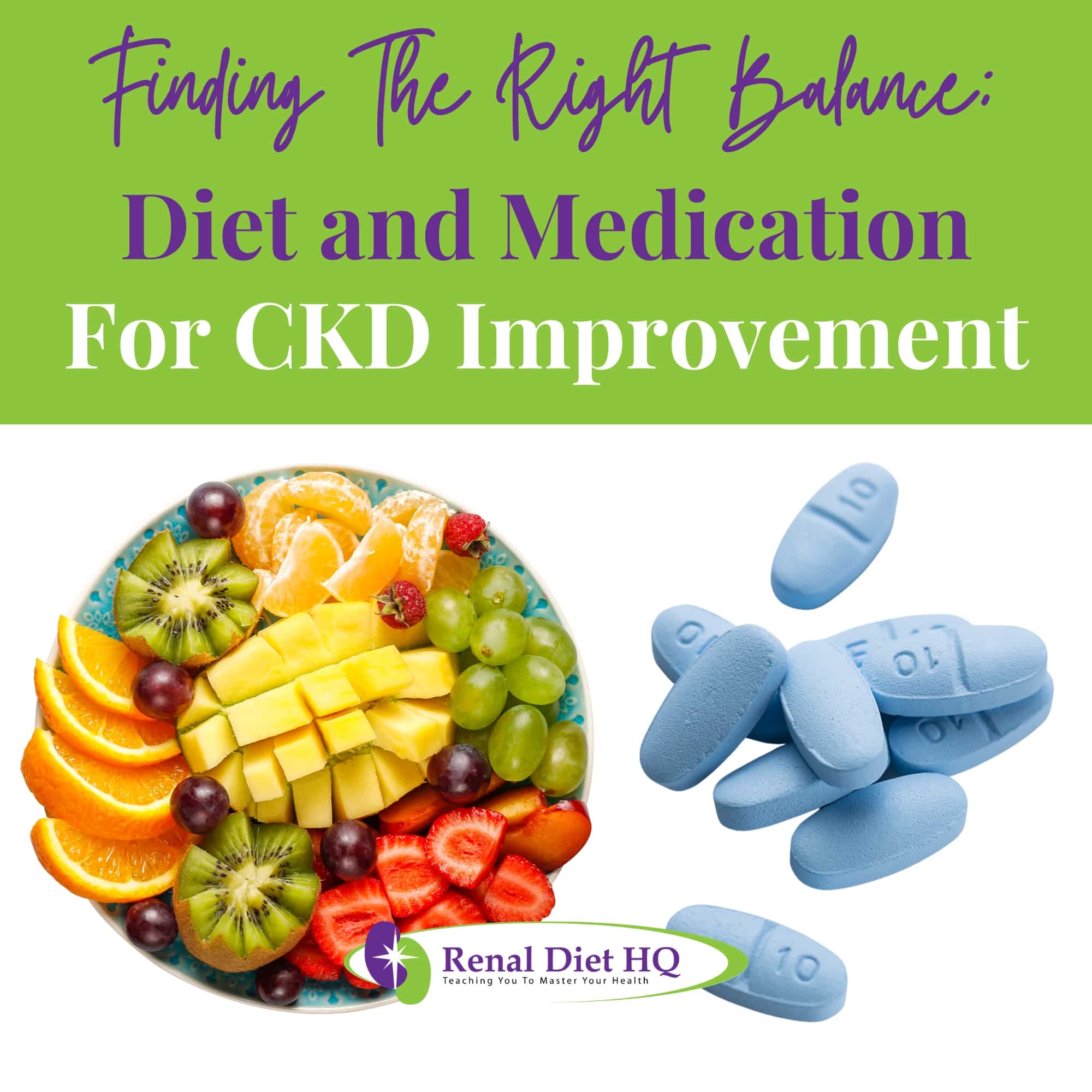
Finding the Right Balance: Diet and Medication for CKD Improvement
When it comes to managing chronic kidney disease, the question of dietary efficacy versus medication often arises. It is important to understand that both diet and medication play significant roles in improving CKD outcomes.
While medications can help slow down the advancement of CKD, a well-balanced diet tailored to an individual's specific needs can also have a positive impact on kidney function.
Therefore, integrating both diet and medication is crucial for achieving optimal results in managing CKD.
Meal Planning and Medication Schedule
Combining a carefully crafted meal plan with a structured medication schedule is a powerful approach for effective Chronic Kidney Disease management. Here's why this combination is beneficial:
- Synergy in Controlling Nutrients: A renal diet tailored to CKD restrictions helps manage protein, sodium, potassium, and phosphorus intake. Medications like ACE inhibitors or ARBs control blood pressure and reduce proteinuria. Together, they provide comprehensive control over nutrient levels and complications.
- Reduced Medication Burden: A well-balanced meal plan can minimize the need for certain medications. For instance, managing potassium intake through diet can reduce reliance on potassium-lowering drugs.
- Enhanced Medication Efficacy: A kidney-friendly diet helps maintain stable electrolyte levels, improving the effectiveness of medications. For example, controlling phosphorus intake can enhance the action of phosphate binders.
- Holistic Approach: A combined approach addresses CKD from multiple angles, mitigating the risk of complications and disease progression. Regular monitoring by healthcare professionals ensures adjustments to both diet and medication, optimizing CKD management.
- Improved Compliance: Meal planning simplifies dietary restrictions, making it easier for patients to adhere to their recommended regimen. Medication schedules, when integrated into daily routines, become more manageable
The combination of a well-structured meal plan and medication schedule creates a synergistic effect, offering comprehensive control over CKD management.
This holistic approach addresses nutrient intake, reduces medication reliance, enhances efficacy, and improves patient compliance, ultimately leading to better outcomes and an improved quality of life for individuals with CKD.
If you need a Comprehensive Healthy Renal Diet Grocery List Guide, check out this one!
Integrating Diet and Medication?
My doctor prescribed a renal diet. To understand how renal diet and medications can be integrated during a full day, here is a Sample Renal Diet Meal Plan and Medication Prescription Schedule for a CKD Patient:
Meal Plan: Breakfast (8:00 AM):
- Oatmeal with sliced strawberries (low potassium)
- Scrambled egg whites (low phosphorus, low potassium)
- Whole-grain toast (low sodium)
- A small serving of unsweetened applesauce (low potassium)
Morning Medication (9:00 AM):
- ACE Inhibitor (e.g., lisinopril) for blood pressure and kidney protection
- Phosphate binder (if prescribed) to manage phosphorus levels
Lunch (12:30 PM):
- Grilled chicken breast (portion-controlled for protein)
- Steamed broccoli (limited portion for potassium control)
- Brown rice (low sodium)
- Mixed green salad with lemon vinaigrette dressing (low potassium)
Afternoon Medication (3:00 PM):
- Diuretic (e.g., furosemide) to manage fluid retention
- If prescribed, erythropoiesis-stimulating agent (ESA) for anemia
Snack (4:30 PM):
- Sliced cucumber (low potassium)
- A small handful of grapes (portion-controlled for potassium)
Dinner (7:00 PM):
- Baked salmon (portion-controlled for protein)
- Mashed cauliflower (low potassium)
- Quinoa (low sodium)
- Steamed asparagus (low phosphorus, low potassium for chronic kidney disease)
Evening Medication (8:30 PM):
- Another dose of ACE Inhibitor or ARB
- If prescribed, sodium bicarbonate for managing metabolic acidosis
Before Bed (10:00 PM):
- Small serving of unsweetened applesauce (low potassium) or a low-potassium protein snack (if hungry)
This sample meal plan combines a variety of CKD-friendly foods while adhering to dietary restrictions, particularly for protein, sodium, potassium, and phosphorus. The medication schedule includes essential medications like ACE inhibitors, diuretics, and phosphate binders, along with other medications tailored to the patient's specific needs.
It's crucial for the patient to follow their healthcare provider's recommendations for medication dosages and timing while regularly consulting with their healthcare team for adjustments and monitoring of kidney function.
FAQs for Diet vs. Medication
Diet alone cannot cure or reverse Chronic Kidney Disease (CKD). While a kidney-friendly diet can slow its progression and manage symptoms, CKD is a complex, often irreversible condition. It's possible to know the facts about Chronic Kidney Disease.
Medical intervention, including medications and lifestyle modifications, is essential to effectively manage CKD and prevent complications. Patients should work closely with healthcare professionals to develop comprehensive treatment plans tailored to their specific CKD stage and individual needs.
Yes, there are specific dietary recommendations and restrictions for Chronic Kidney Disease patients. These typically include limiting protein intake, reducing sodium and phosphorus, and monitoring potassium and fluid consumption.
The exact guidelines depend on the stage of CKD and individual health factors. A registered dietitian or healthcare provider specializing in CKD can provide personalized dietary advice to help manage the condition effectively while maintaining overall nutritional health.
Medications commonly prescribed for Chronic Kidney Disease (CKD), like ACE inhibitors, ARBs, or diuretics, can have side effects. These may include low blood pressure, electrolyte imbalances (such as high potassium levels), increased blood urea nitrogen (BUN), and changes in kidney function.
It's crucial for CKD patients to work closely with their healthcare providers to monitor and manage these potential side effects, adjusting medications as needed to achieve the best therapeutic balance while minimizing risks.
Yes, lifestyle interventions are crucial alongside diet and medication for Chronic Kidney Disease improvement.
Regular physical activity helps maintain a healthy weight, control blood pressure, and improve cardiovascular health, all of which benefit CKD patients. Smoking cessation is vital, as smoking exacerbates kidney damage.
Managing stress through relaxation techniques can also aid in overall well-being. Adequate sleep is important for kidney health. Finally, avoiding excessive alcohol consumption helps prevent complications.
These lifestyle adjustments, when combined with an appropriate diet and medication regimen, create a holistic approach to managing CKD and promoting better quality of life.
Making a Difference: Diet vs. Medication
You can make a huge difference in your overall health and well-being by making major dietary changes. With chronic kidney disease, you will notice a huge difference in your overall wellness just by making big dietary changes.
In fact, you could potentially stop the damage of kidney disease and effectively avoid dialysis in the future if you are vigilant about your diet. Of course, you should always listen to your doctor's orders and inform them of any changes you plan to make with your diet or treatment plan. The right kidney disease treatment diet does exist for you!


